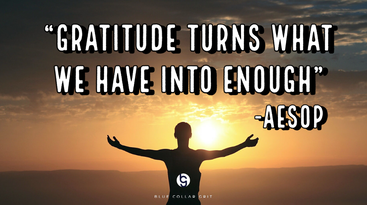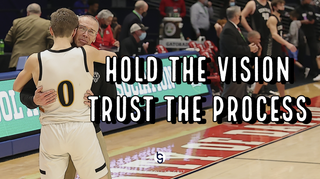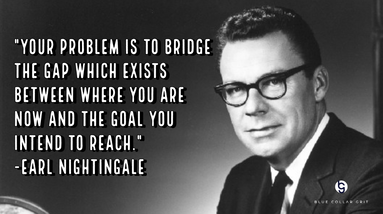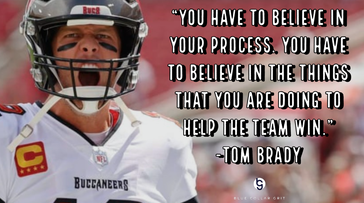Giving ThanksThanksgiving is my favorite holiday.
Yes, it’s basketball season, but that’s not the only reason. Thanksgiving is pure, at least in it’s celebration. Primarily because it isn’t diluted with the expectations of buying, or receiving, gifts. It’s simply a time to share gratitude and appreciation for each other. It seems to me that we need to practice thanksgiving more regularly than once a year. Why Should We Care? As a leader, I think it’s critical to have systems in place that allow team members to openly share their appreciation for each other. If it’s left to chance, expressing gratitude seems to fall victim to ‘I didn’t have time’ quite often. I’m a big advocate for gratitude journals and writing down three things you are thankful for each day. It’s one of my daily routines. I love Thankful Thursdays when our team sends a text of gratitude to three people they are thankful for, reminding them why they are grateful for them. Better than a text is a handwritten letter, of course. However, nothing beats a face-to-face thank you. It’s awkward and awesome at the same time. Saying “Thank You” or sharing gratitude is one of the habits Daniel Coyle identified as consistently appearing in the interactions of elite teams. I believe the reasons for this are numerous, but here are a few that standout on the teams I’ve worked with.
Here are a few systems we have in place to say “Thank You”.
Saying ‘Thank you’ is one of those Slight Edge habits that Jeff Olson writes about in his book. They’re easy to do and easy not to do. Choosing to do it can change your team. For more information on building excellence in your teams, visit us at www.bluecollargrit.com. We would love to know how we could help!
0 Comments
Proud of What?A little different tilt to my message this week, but hopefully you can find something beneficial to take away from it.
Our son, Gabe, accepted a scholarship offer to Indiana University to play basketball this week. He’s been incredibly fortunate to be in this position and is grateful for the opportunity and the trust Indiana’s coaching staff has shown in him. However, to say I’m proud of Gabe for this wouldn’t be accurate. Prior to his announcement he wrote letters to me, his mom, and his sister. All were heartfelt and personal expressions of his appreciation for our investment in him, but a line in the letter to me stood out. He said, “Almost everything I do in life is in an effort to make you proud.” I don’t think this is an uncommon feeling for kids. I know it’s not for me. I’m 45 years old and still want to make my dad proud. It’s one of the best things you can hear as a son or daughter - a parent sharing that simple encouragement: “I’m proud of you.” However, it does raise an urgency in me to be sure he knows what I’m proud of him for. Because, it’s not a scholarship to Indiana. I’m proud of him for being faithful in his work ethic when the results weren’t there ... yet. I’m proud of him for playing his last AAU season with a broken finger and his last high school season with a fracture in his ankle ... and never using it as an excuse to not perform. I’m proud of him for prioritizing his team over his numbers. I’m proud of him for being in the gym at 5:30am the morning after winning a state championship. I’m proud of him for choosing to wear #0 in high school to honor one of our former players that didn’t have the opportunity to play in his last HS game. I’m proud of his bench celebrations when he wasn’t big enough for his feet to reach the floor and his appreciation for those former players that did it the right way. I’m proud of him for crying in the living room after a tournament while telling us that he was feeling pressure to perform and that he felt like he could never play well enough … and that he just wanted to be able to wear sweatpants to church again. I’m proud of him for becoming intentional with his life ... finding his faith, core values, and his purpose - then measuring his success on his fulfillment of Selfless, Devoted, and Neoteny instead of society’s definition of success. I’m proud of him for getting up at 5:30am in Las Vegas as 6th grader to go workout before his AAU games later that day ... while everyone else was sleeping. I’m proud of him for going for it when he went to the North Coast Blue Chip tryouts - asking Bronny to play 1 on 1 during a water break, just to see how he measured up. I’m proud of him for working out three times a day in preparation for the North Coast Blue Chip tryouts in 4th grade. I’m proud of him for giving his lunch money to the kid in front of him in line that couldn’t afford their lunch at Cline Elementary. I’m proud of him for standing by his dream of playing in the NBA when kids in his 3rd grade class laughed at him. I’m proud of him for playing the game the right way. It’s not the scholarship I’m proud of at all. It’s the process he’s embraced that makes me smile. I would be proud of him if he never took another dribble. Basketball has served its purpose in his life. He’s devoted. He knows the value of hard work and sacrifice. He’s selfless. He prioritizes his team over anything personally. He lives with neoteny. He smiles … a lot. There is child-like curiosity and joy he brings to the toughest challenges. Gabe has trusted the process and surrendered the outcome. I’m proud of the process, not the result. Go Hoosiers. For more information on building excellence in your teams, visit us at www.bluecollargrit.com. We would love to know how we could help! Capability GapNick Saban, head football coach at Alabama, recently used the phrase ‘capability gap’ in place of ‘potential’ during an interview. I thought it was a brilliant delineation from the typical answer around under achievement.
Saban points out that people often discuss other’s potential in an effort to help move them forward. This is typically a conversation with few actionable points for true growth. Saban chooses to discuss a player’s capability gap. “The capability gap is what you are capable of, relative to what you are doing. People should be aware of that.” Saban counters. He adds, "I think if you understood the truth about that, you can actually take information that can help you sort of close that gap, which is, hopefully, if you are a competitor and you want to do well in the world, that's something you should be interested in doing." Put in this context, it’s hard to argue against his perspective. Why Should We Care? Viewing improvement through the lens of a capability gap brings light to the growth mindset all leaders would like to drive through their team members. The focus can be directed at narrowing the gap rather than realizing one’s potential. I see it as more actionable, more real. There are specific things each team member could do in order to shrink their capability gap. All are different and require unique actions, but all can be intentionally pursued. The belief and hope it communicates is palpable, while not dismissing the gritty facts. We have capabilities; however, they’re not what they could be, should be, or will be. We have work to do. Providing feedback to those around us that serves as a jumpoff point for progress is a big deal for leaders. We often go too far in trying to spare feelings that the truth becomes diluted or even obscured. I think that is exactly what the phrase capability gap can help us with I love the approach when helping others, but it may be even more impactful when it’s directed inward and asked to one’s self: Where are my capability gaps as a Father? Husband? Friend? Leader? I know that leads me to some answers that ignite an urgency to change. REAL TALK - Action Steps Like any good idea, it’s only as useful as you make it. Here are a few ways I’m going to try to implement the ‘capability gap’ into our teams.
Our capability gap, and our team’s capability gap, is a powerful place to look for improvement and growth. Knowing the gap will never close completely, the pursuit of reducing it is the progress that provides fulfillment and accomplishment to those seeking excellence. For more information on building excellence in your teams, visit us at www.bluecollargrit.com. We would love to know how we could help! Do Your JobI’m at church on Sunday watching the band play during the opening part of the service and caught myself staring at the drummer. He’s completely engulfed in the beat of the music and flowing effortlessly from drum to drum, all while smiling and seeming to be enjoying every minute of it.
As the song went on, my eyes drifted over to the guitarist. He’s leaning over, possessed by the music he’s creating and fully present with nothing but the song and his guitar. The music quieted towards the end of the song as the vocalist took over. Same thing. The music all but subsided, leaving only the soloist and her backups to bring the song home. She appeared as if nothing else in the world was going on. They were each just doing their job. Why Should We Care? This is how teams should function. It’s how the best teams DO function. I’m sure there are numerous run throughs and conversations prior to each performance. And, I’m sure there is plenty of dialogue from each musician in order for the team to produce the best music possible. But ... At no point did I see the drummer take-off on his own solo while brushing off the song the band was playing. I didn’t notice the guitarist banging his guitar on the floor because he wasn’t sure the drummer would play the right notes. And, I didn’t catch the backup singers stepping forward and singing so loudly that we couldn’t hear the lead vocalist. Everyone just did their jobs. That’s it. Nothing more. Nothing less. Just their jobs. So much of the trouble for teams occurs when we forget, or dismiss, this simple principle. It’s one of the reasons I despise MVP awards. We ask all the people to sacrifice for the team, give up their goals for the goals of the group, and to support their teammates and leaders through the good and bad. We talk about how everyone's contribution is critical for the success of the team and how no person’s job, or role, is any more or less important than another’s. Then we pick one person to be the MVP. How is this consistent with the message above? If it’s really supposed to be about the team, then it’s not. REAL TALK - Action Steps Maintaining perspective as a leader can be difficult. Consistently emphasizing the value in the team should not be. Here are a few ideas on keeping the team at the forefront of your decisions and being intentional about recognizing all contributors.
I like to say “Trust the process”. I think the right process leads to the right outcome most of the time. We can’t control the outcome, but we can control the process. The process always boils down to one thing: doing your job. For more information on building excellence in your teams, visit us at www.bluecollargrit.com. We would love to know how we could help! |
About bcI'm a teacher, coach, and parent seeking excellence while defining success on my own terms. Archives
July 2024
Categories |





 RSS Feed
RSS Feed